442's ranking of 100 best footballers: Messi tops, Maradona 2nd, Cristiano 3rd
unsdftropsentimental 2022-10-11 11:20:02 评论
From Messi to Maradona, Cristiano to Cruyff, FourFourTwo count down the greatest footballers to have played the game.
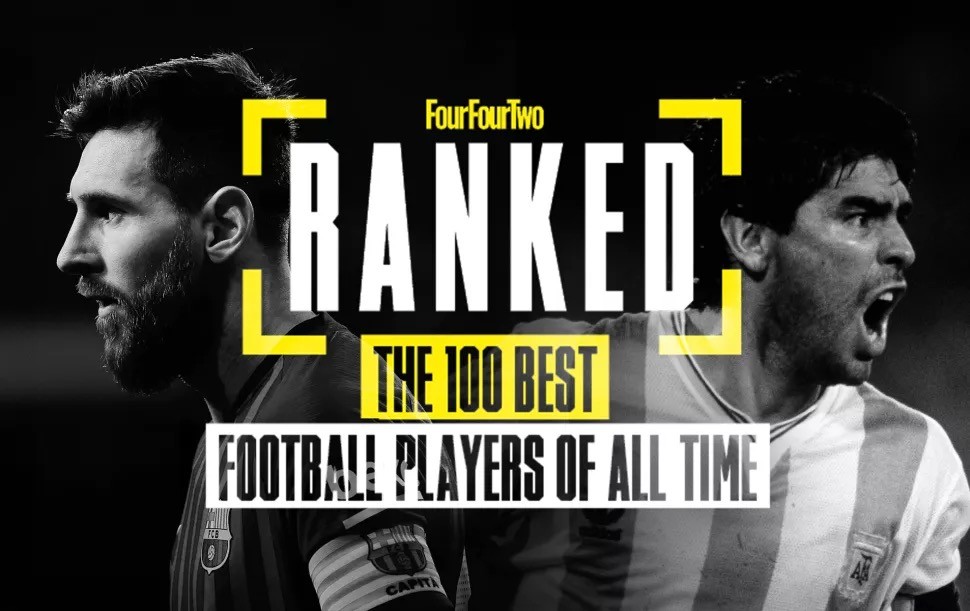
When a manager has to choose between two excellent players in the same position, the Big Book of Football Cliches says we must always refer to this "selection headache" as a "good problem to have".
Having weeks trying to narrow down every male footballer ever into a list of 100, we at FourFourTwo now realise just what nonsense that is. Selection becomes near-impossible conundrum as you realise just how many outstanding footballers there have been, across continents and across decades.
Frankly, we could do another list of 100 great players not to even make the cut. But in the end, we're had to pick the players we feel were the most influential in their particular era, the most memorable, the players who awed us with their talent and their achievements. In short, the 100 greatest footballers ever.
The Top 10
10. Ronaldo
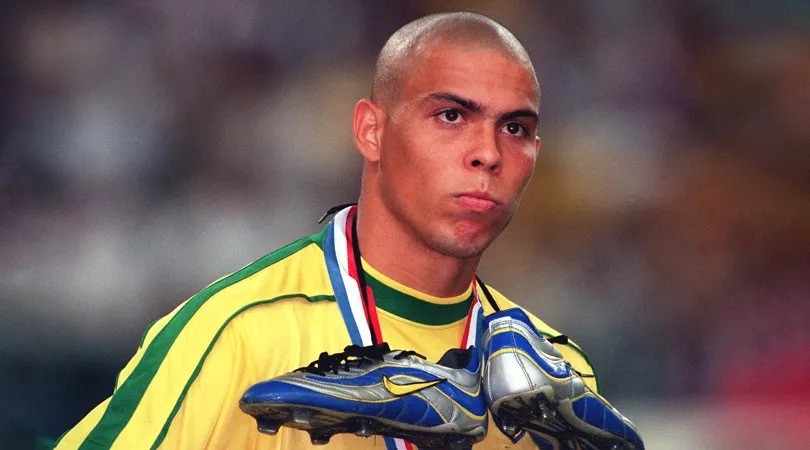
“Did you get that on tape?” Ronaldo asked reporters with a smile on his face after scoring his fifth goal in one 1993 match.
He wasn’t the Brazilian Ronaldo back then. He was known as Ronaldinho and had netted 12 times in his season debut for Cruzeiro, five of them against Bahia, including a masterpiece where he stole the ball from veteran Uruguayan goalkeeper Rodolfo Rodriguez and rolled it into the empty net. Back then, he might not have known that he would get lots of these moments on tape. More accurately, 420 goals throughout his career.
The bald-headed, gap-toothed kid’s place in the pantheon of modern greats is now secure. He won his first FIFA World Player of the Year award at the tender age of 20 in 1996, went on to become the second footballer to be honoured three times, claimed the Ballon d'Or twice and became the World Cup’s greatest scorer in 2006 with his 15th strike (since surpassed by Miroslav Klose in 2014).
Has there ever been a more impressive debut season for a club anywhere in the world than R9 managed in Barcelona? The Brazilian scored 47 goals in 51 matches as the Catalans won the Copa del Rey and UEFA Cup Winners’ Cup, and narrowly missed out on La Liga – but Barça couldn't hang on to him for long, as the forward signed for Inter in 1997 and was the star attraction at the 1998 World Cup, where he won the Golden Ball and finished with four goals.
Yet the last chapter infamously didn't go as planned: he suffered a fit before the final against France and failed to perform after he was eventually named in the starting line-up, as Brazil lost 3-0 to the hosts. He later signed for Real Madrid and showed tantalising glimpses of his best form as one of the galacticos. Yet Ronaldo was never quite the same again and retired in 2011 – still scoring goals, but with his game necessarily reinvented thanks to his loose lifestyle and dodgy knees.
Career highlight: His brace in the 2002 World Cup Final for Brazil against Germany sealed one of the game’s greatest comeback tales.
9. Ferenc Puskas
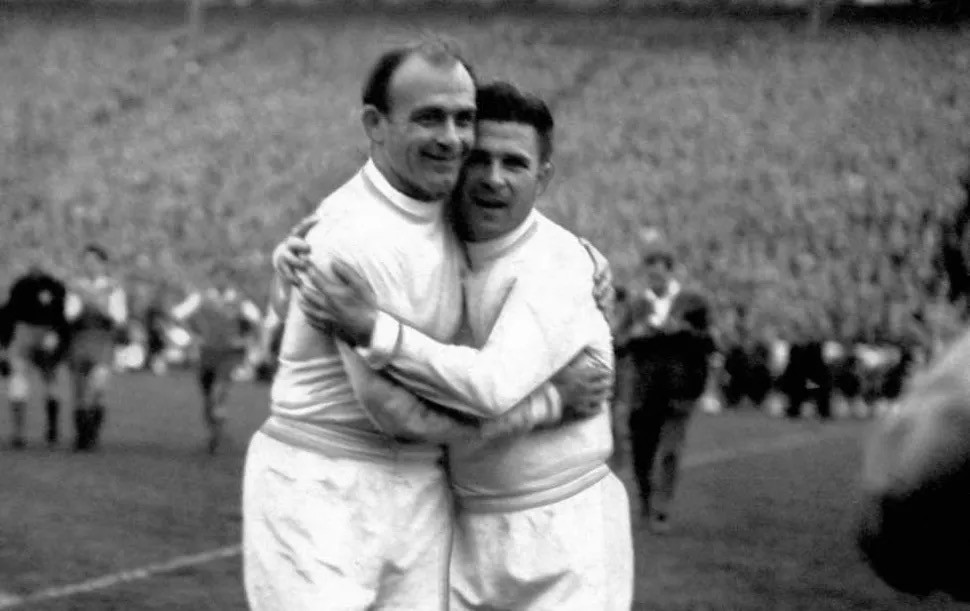
"He had a roly-poly physique but a wonderful left foot and he was a brilliant finisher. I would put Puskas in any list of all-time greats." - Sir Tom Finney.
Puskas started playing for the national team aged 18, and found the net on his debut. Naturally: Puskas always scored. He averaged more than a goal per game throughout his illustrious career, including 87 goals in 85 caps for Hungary.
Four of them came at the 1954 World Cup, when Puskas proudly wore the captain's armband and opened the scoring in the final against West Germany after only six minutes. But sadly he wasn’t fully fit for that match, after sustaining a hairline fracture against the same opponents in the group stage. Hungary lost the final 3-2 in a notable upset.
After the revolution of 1956, he chose not to stay in Hungary and sought to continue his career abroad. Unfortunately for him, a subsequent UEFA ban meant it was a further two years before he was able to represent Real Madrid. He finally joined at the age of 31 in 1958, but still became one of their most prolific scorers in history with 242 goals in 262 appearances. His partnership with Alfredo Di Stefano was truly breathtaking, but he outlasted the great Argentine, staying until 1966.
Spain became his second country, and Puskas even represented them at the 1962 World Cup, albeit without success. His legacy is cherished in both Budapest and Madrid, and his unique style, scoring record and longevity confirm his place as one of the greatest players in history.
Career highlight: Puskas scored four goals – all in the second half – in his only European Cup final appearance, as Real Madrid thrashed Eintracht Frankfurt 7-3 at Hampden Park in 1960. He'd missed the previous final in 1959 through injury, and didn't make the starting line-up as Madrid won the last trophy of his career in 1966.
8. Franz Beckenbauer
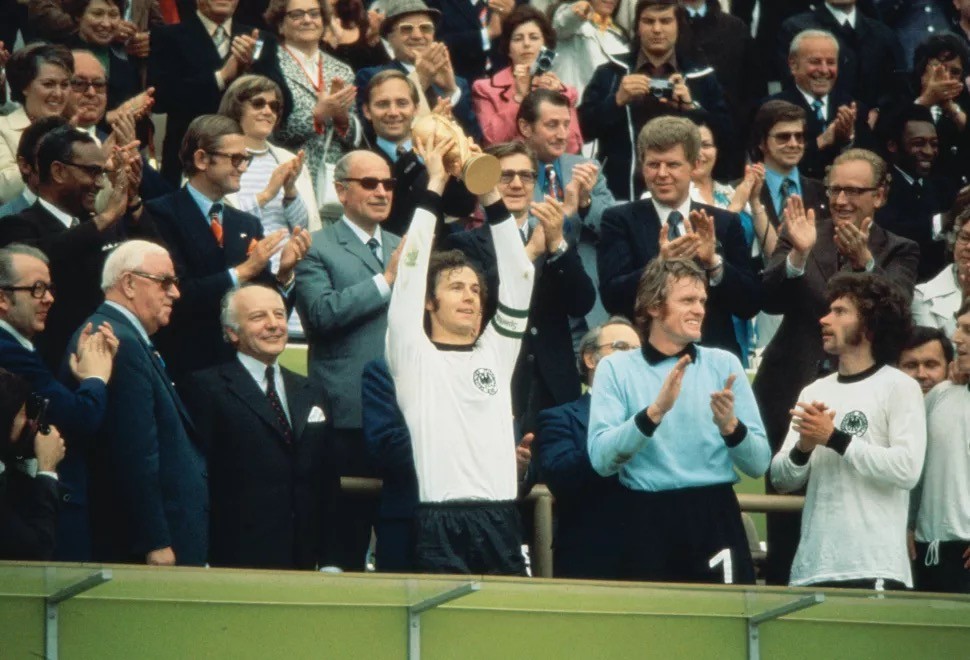
Like many great players, Beckenbauer was adept at playing in several positions. Originally a centre-forward, he actually made his Bayern debut in the Regionalliga Sud as a left winger, and in his first full season, Bayern won promotion to the recently formed Bundesliga. As Bayern’s youth team products blossomed, Bayern gradually became the dominant force in West German football.
There are two versions of the story about how Beckenbauer was given the 'Kaiser' moniker. Beckenbauer claims it was because, in 1968, he posed alongside a bust of former Austrian Emperor Franz Joseph, and the media referred to him as Fussball Kaiser afterwards. Alternatively, it was because in the 1969 German Cup Final he fouled Schalke’s Reinhard Libuda, often known as Konig von Westfalen (King of Westphalia), and the press believed that Beckenbauer had now trumped him.
Either way, the exalted moniker was entirely befitting: Bayern won a hat-trick of Bundesliga titles between 1972 and 1974, and did likewise in the European Cup between 1974 and 1976. On the international stage, Beckenbauer captained West Germany to triumph in the 1972 European Championship and 1974 World Cup.
Like Bayern, Beckenbauer wasn’t universally loved, and often expressed shock at the aggression displayed towards his team at Bundesliga away games. Aged 18, he was banned from the West German youth team for refusing to marry his pregnant girlfriend, and – controversially - he was no longer selected for international matches after joining the New York Cosmos in 1977 for a hugely successful four-year spell.
Der Kaiser returned to the Bundesliga in the early 1980s, when he led Hamburg to the league title. Naturally. He was a born winner.
Career highlight: At Hampden Park in 1976, Beckenbauer captained Bayern on the night they completed a hat-trick of European Cup victories, defeating Saint-Etienne. “I still have a huge feeling of pride about that one,” he later recalled.
7. George Best
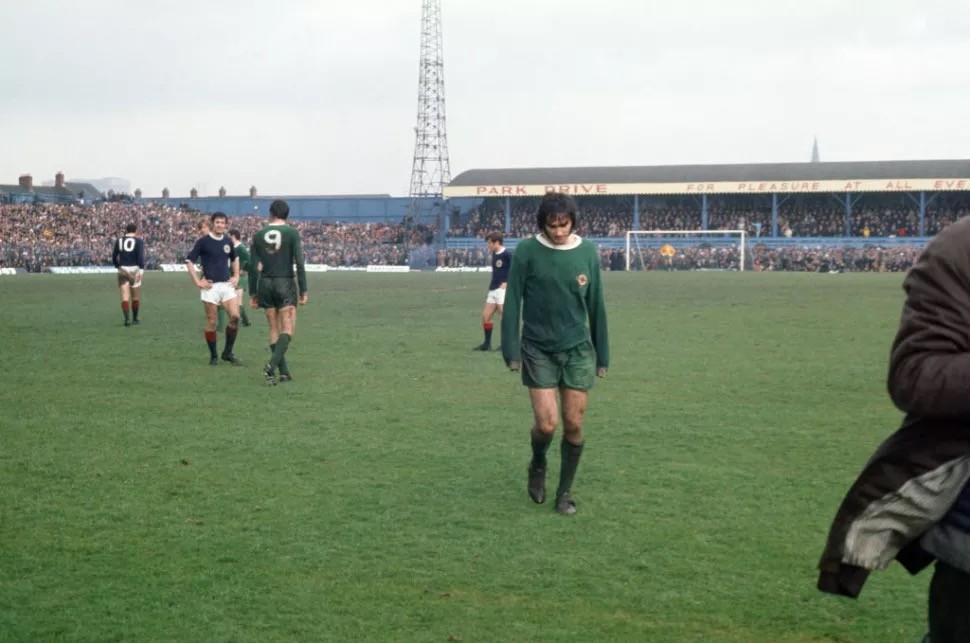
It was in 1968 that, aged 22 – his pace, belief, technical ability, balance and creativity in perfect symmetry – Best deservedly followed the other two of United's ‘Holy Trinity’ (Denis Law and Bobby Charlton) in winning the Ballon d'Or. After this, his decline gradually began.
Best had made his debut for United in April 1963. By 1968, he’d twice won the English league title, while his 32 goals in 53 games in ‘67/68 coincided with them winning the European Cup.
Yet at the end of the first week of 1972, with United declining and Best’s gambling and drinking increasing, they fined him for missing the week's training. He also twice announced his retirement, gained weight through his inactivity, only to change his mind without rediscovering his previous level.
His last appearance for Manchester United, against QPR, came on January 1 1974, before the period in which he appeared for 11 teams including Fulham, Stockport, Hibernian, and Los Angeles Aztecs. In 1984 he retired permanently. By the point of his death in 2005, at the age of 59 following illnesses related to his alcoholism, Best had twice married and twice divorced, struggled financially, and even spent 12 weeks in prison in 1984.
"I was the one who took football off the back pages and put it on to page one," was, appropriately, one of his better-known quotes. Yet Best had enough magic on the pitch and enough star quality off it to dominate both.
Career highlight: He may have preferred his dalliance with the 1973 Miss World, but his performance in the 1968 European Cup Final against Benfica inspired the 4-1 victory that made United the first English winners of the competition.
6. Johan Cruyff
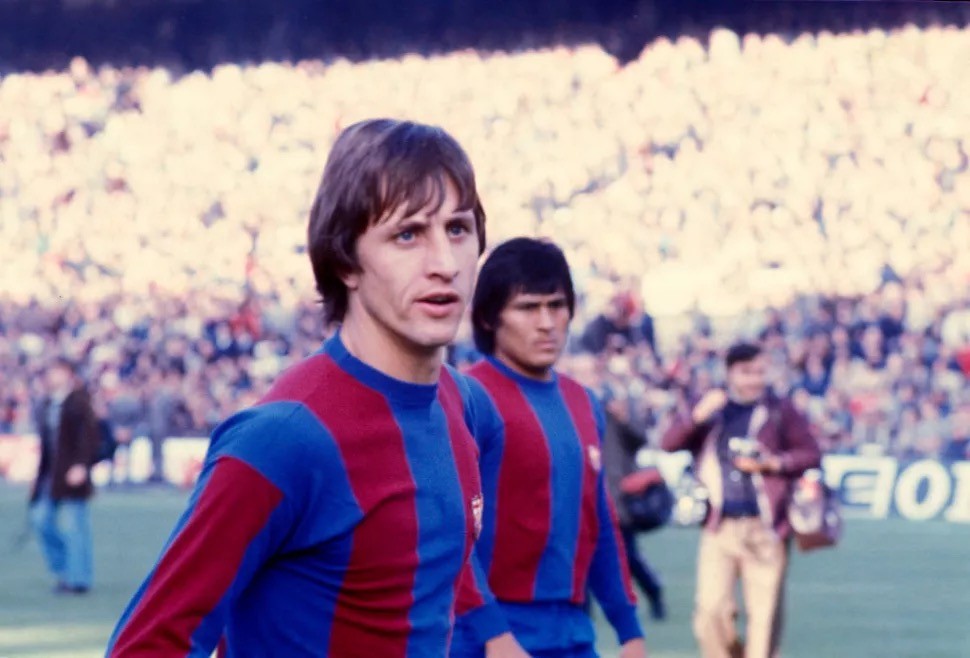
"As a player he turned football into an art form. Johan came along and revolutionised everything. The modern-day Barca started with him, he is the expression of our identity, he brought us a style of football we love." - Joan Laporta
Two months after making his first-team debut, Cruyff met former PE teacher Rinus Michels. Together, the pair invented Total Football. Wingers and overlapping full-backs kept the pitch wide, defenders were encouraged to bring the ball out from the back (if a midfielder dropped to cover the space) and the centre-forward – usually Cruyff – could roam free as Michels’ on-field conductor.
It worked. Cruyff won 20 major honours – including three successive European Cups from 1971 to 1973 – before a player revolt had him banished to Barcelona. Not content with revolutionising one club, El Salvador (the saviour) did so again, winning the Catalans’ first Liga title for 14 years. Nobody could match his speed, vision or eye for goal.
Part of arguably the best team never to win the World Cup in 1974 – the Netherlands lost 2-1 to West Germany in the final, having gone 1-0 up without the hosts touching the ball – Cruyff may not have reached his peak with his national team, but that only adds to his allure.
He retired in 1978, aged 31, and refused to go that summer’s World Cup. The following year, however, he was back, having lost the vast majority of his fortune in a pig farm venture in Catalonia. Spells in America for the Los Angeles Aztecs and Washington Diplomats followed, as did a trophy-laden return to Ajax and even a season at their bitter rivals Feyenoord.
“Cruyff always seemed to be in control. He made things happen,” said Rudi van Dantzig, a long-time collaborator of the great ballet dancer Rudolf Nureyev, himself a close friend of Cruyff’s. “There was something very dramatic about him, like a Greek drama – life or death, almost, even when they played ordinary Dutch League games.”
Career highlight: That turn, at the 1974 World Cup against Sweden. It remains football’s great conjuring trick and is also recipient Jan Olsson’s career highlight. “I loved everything about this moment and knew it would become famous,” the Swede later said. “I thought I was going to take the ball. I still cannot understand. Every day I think about football, I think about Johan Cruyff.”
5. Zinedine Zidane
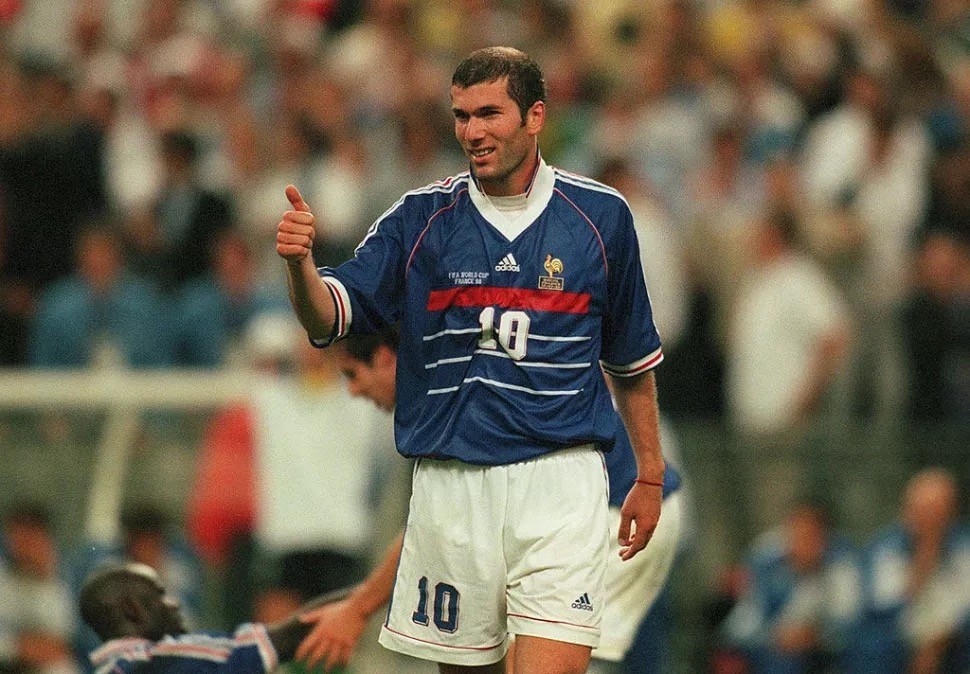
There's a common conception in football that the most creative talents also tend to be the least efficient; that style comes at the expense of steel. It’s what constitutes the idea of the luxury player. Zidane was the most luxurious player possible and yet combined it with towering levels of competitive resolve: a heady cocktail of technique, grace, competitiveness and the uncanny ability to pick his moments with aplomb.
For a player whose basic function was to facilitate and create, and who was far from a prolific scorer, he was remarkably decisive – as evidenced by goals in two separate World Cup finals and an astonishing winner in a Champions League final for Real Madrid in 2002.
But as productive as he may have been, the sense was always that you were watching an artist at work.
Most sportspeople gear their game around what is most likely to bring them success, sacrificing aesthetics and extravagance at the altar of shiny medals. For Zidane, such a compromise was heresy: success was simply the inevitable result of his on-pitch beauty.
Career highlight: Decisive goals in World Cup and Champions League finals seem the only ports of call here, but to many purists, his finest moment came in the quarter-finals of the 2006 World Cup. Against Brazil, though, Zidane put in one of the all-time great performances, a divine exhibition of dribbling and ball-playing from central midfield – equal parts no-nonsense maturity and youthful exuberance – to roll back the years, secure himself the player of the tournament award and guide his country towards the final.
4. Pele
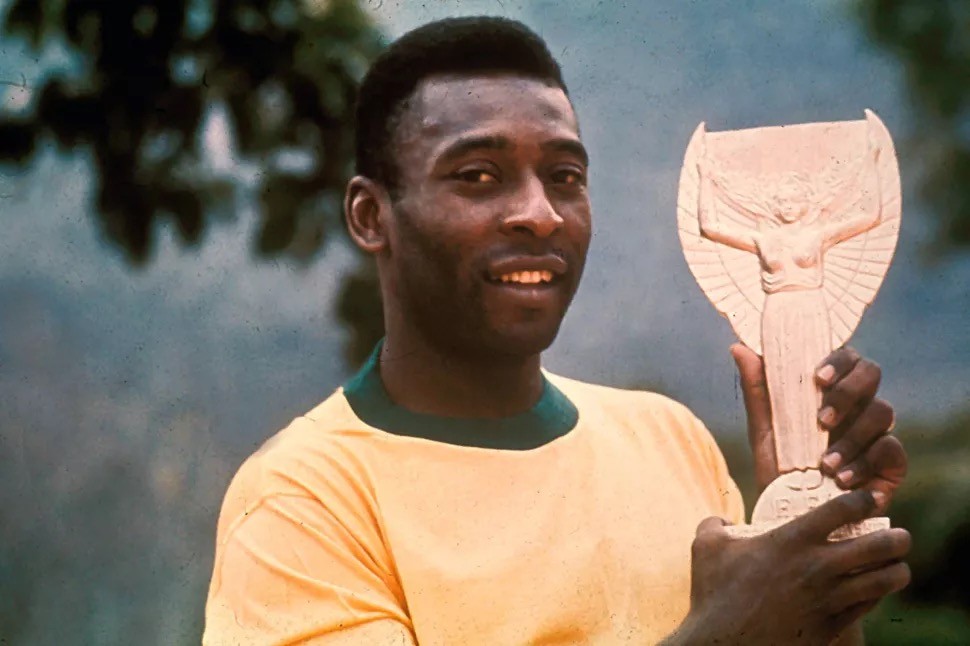
At the age of 17, in 1958, Pele became the youngest player to feature in a World Cup final. He scored six times in Sweden, including a semi-final hat-trick and two more in the final. It was to be the first of three World Cup trophies he brought back home as an answer to those tears he saw running down his dad’s face.
His contribution in 1962 was minimised by injury, while the persistent fouling of him in 1966 made him swear that it would be his last World Cup. He didn’t stick to it. He was convinced into returning for a fourth tournament in 1970 and became part of one of the best attacks ever compiled – alongside Tostao, Jairzinho, Rivellino, Clodoaldo and Gerson. While Jairzinho top-scored, Pele added four more to his World Cup tally.
In the 1960s and '70s, Pele travelled the world with his club team Santos. In Nigeria, a two-day truce was declared in the war with Biafra as a way for both sides to watch him play. His impact on the Nigerian football psyche is so huge that when he predicted an African nation would win the World Cup before the noughties, local fans already saw it coming.
“In some countries they wanted to touch him, in some they wanted to kiss him. In others they even kissed the ground he walked on,” said his former team-mate Clodoaldo.
The Brazilian played his last game for Santos in 1974 and postponed his retirement plans to sign for the New York Cosmos. He was in debt and desperate to recover his finances, so chose to move to the North American Soccer League. After leading the Cosmos to the NASL title in 1977, he played his farewell game on a rainy New York day. But how many days he'd brightened before that.
Career highlight: On November 19, 1969, Pele scored his 1,000th goal from a penalty in a match against Vasco da Gama at the Maracana stadium.
3. Cristiano Ronaldo
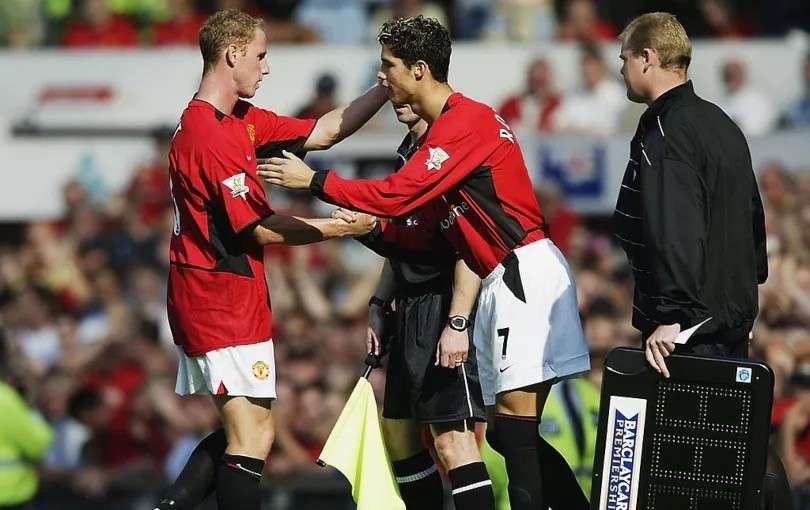
We all know his attributes: instinctive finishing, sharp movement, unrivalled focus. He has the explosiveness of a sprinter, the musculature of a cage fighter, the leap of an NBA player. His repertoire includes dizzying solo runs, gravity-defying free-kicks, headers in which he appears to hang in the air. As a goalscorer, he is as close to complete as imaginable.
Sir Alex Ferguson said he never managed a more talented player, and yet talent is only part of what makes Ronaldo impressive. Even more formidable is his mental fortitude. If some have been better, very few – if any – have been as professional, disciplined and dedicated.
Already a United great at 24, Ronaldo moved on to Madrid, proving a snip at £80m. As trophies have been lifted and records shattered, he has evolved from tricky winger to a herculean goalscorer, prolonging his stay at the top.
At 32, an age when most forwards are past it, his ascetic lifestyle has enabled him toscore crucial goals as Madrid won a Liga and Champions League double in 2017. Time may get every footballer in the end, but Ronaldo looks well prepared to put up a fight.
In retrospect, history may deem him unlucky to have shared the same era as Lionel Messi, but many will be inspired by his achievements. Few footballers have taken their pursuit of greatness to such extremes. For those who cannot rely on innate talent, Ronaldo’s records will stand as a monument to determination, persistence and willpower.
Career highlight: In 2008, a towering Ronaldo header helped Manchester United to the Champions League title, leading him to his life-long goal of being voted the best player in the world. He had reached the pinnacle at 23 - and yet it was just the start.
2. Diego Maradona
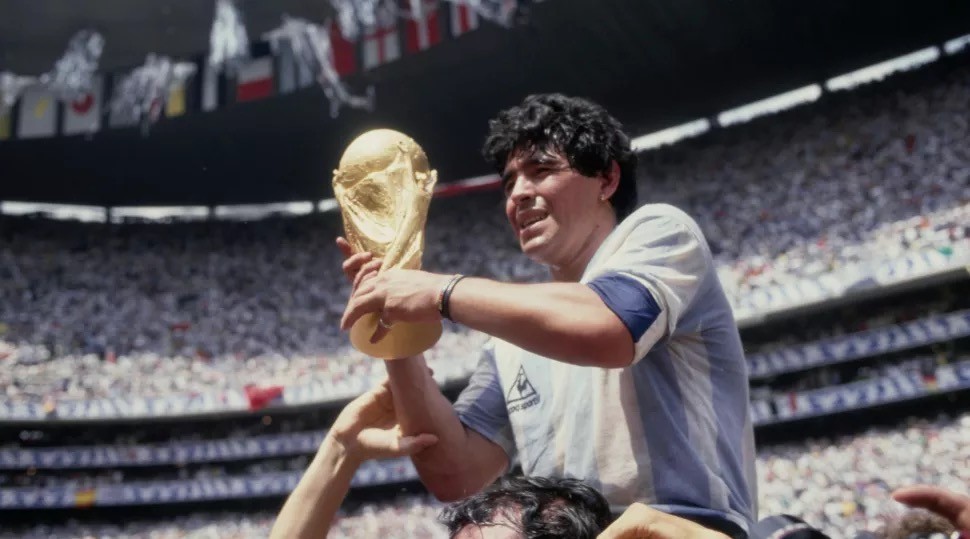
Pele scored more goals. Cristiano Ronaldo has won more trophies. Both have lived more stable lives than the overweight former cocaine addict who comes second on this list, whose relationship with football became increasingly strained the longer his career continued. If you’ve seen Diego Maradona with a football at his feet, you’ll understand.
After winning the league with Boca Juniors, Maradona moved to Barcelona for a world-record £5m fee in 1982. It was in Catalonia that he first tried cocaine, contracted hepatitis and had his ankle broken by Andoni Goikoetxea in September 1983. The Butcher of Bilbao has the boot used in that particular assault immortalised in a glass case at home.
Maradona sought revenge in the 1984 Copa del Rey Final – headbutting one player, elbowing another and kneeing one more in the head, knocking them out cold – and was swiftly sold, for another world-record fee, to Napoli.
It was in his seven seasons in Naples that Maradona confirmed his legend. The Church of Diego Maradona still exists. The Partonopei had never come close to winning Serie A before the Argentine arrived, but such was El Diego’s individual brilliance that Napoli won Scudetti in 1987 and 1990. En route to winning the UEFA Cup in 1989, El Pibe de Oro’s (The Golden Boy) semi-final warm-up before facing Bayern Munich has long since entered football legend.
Then there’s Argentina and the 1986 World Cup. Jorge Valdano, Jorge Burruchaga and Oscar Ruggeri were fine players, but – like Napoli – it’s impossible to countenance la Albiceleste winning the tournament without their captain and magician’s five goals, five assists and general brilliance.
Ever the Machiavellian – learned the hard way on the Buenos Aires streets with what locals calls viveza criolla, or native cunning – the ends always justified the means. He knew ‘the Hand of God’ should have been ruled out – he screamed at his team-mates, “Come hug me, or the referee isn’t going to allow it” – but beating England in the quarter-final was more important.
“I felt like applauding. I’d never felt that before,” said Gary Lineker, who was playing that day. “It was impossible to score such a beautiful goal. He’s the greatest player of all time, by a long way. A genuine phenomenon.”
Career highlight: Scoring the Goal of the Century en route to World Cup glory in 1986. Mortals just shouldn’t be able to do that.
1. Lionel Messi
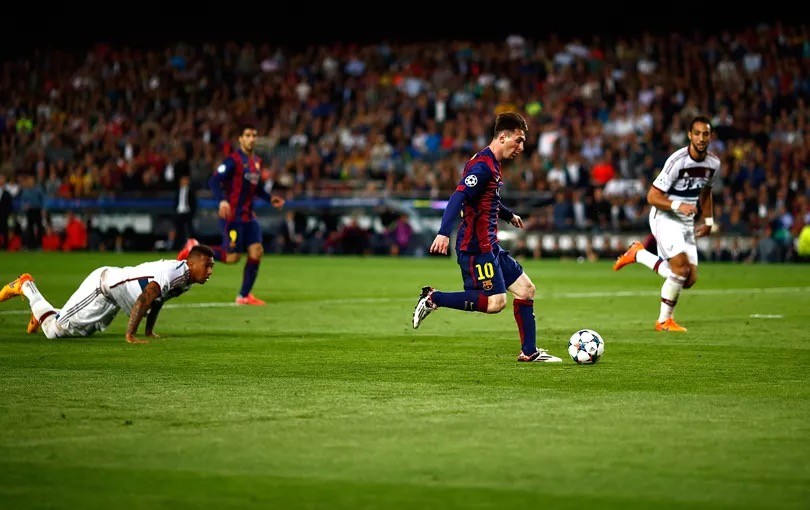
The history books will laud Messi, and yet their limitations will do him a disservice. In 20 years, young football fans will read about a messianic figure whose brilliance stunned the world, shattered a litany of records and started an era of dominance… but not until they watch the videos will they get an idea of what they have missed.
The quantity of his goals pale in comparison with their beauty. The goal of the month may not even make his top 20, be it a solo run, a bending free-kick, a cheeky lob, a golf putt finish or a thunderous missile.
By now most know his story: how expensive medicine for a growth hormone deficiency led him from his home town Rosario to Barcelona, where his 2004 debut started an era of brilliance. He has been voted into the world's top three players for 10 years, and in the top two for nine.
It’s one thing to reach the top, quite another to stay there. There are fans well into their 20s who have never known a world in which Messi is not spellbinding us on a weekly basis.
Only by evolution has Messi managed to maintain his level. The livewire dribbler has become a mature playmaker who now dictates play while still proving decisive in the final third. Never has Messi, now in his 30s, better balanced playmaking, dribbling and goalscoring. As Javier Mascherano has said, he is three players in one. You could argue that one of the greatest goalscorers of all time is also the best passer, and you would not lack evidence to support your claim.
Yet Messi is not finished. A World Cup next month presents another shot at glory with Argentina. His legs slower but his mind still sharp.
In the meantime, pundits, fans and writers will try to express his greatness with words and metaphors. They will all fail, as will the article you are reading now. The best we can do is listen to Pep Guardiola, who said: “Don’t write about him, don’t try to describe him. Just watch him.”
Career highlight: Days after criticism of his aerial game, Messi steered a looping header over Edwin van der Sar that sealed Barcelona’s 2-0 win over Manchester United in the 2009 Champions League Final. It's one of his personal favourites, he once told FFT.
To see the full ranking click here.
- 消息参考来源: All Football
- 严禁商业机构或公司转载,违者必究;球迷转载请注明来源“懂球帝”
- 懂球帝社区规范:抵制辱骂

